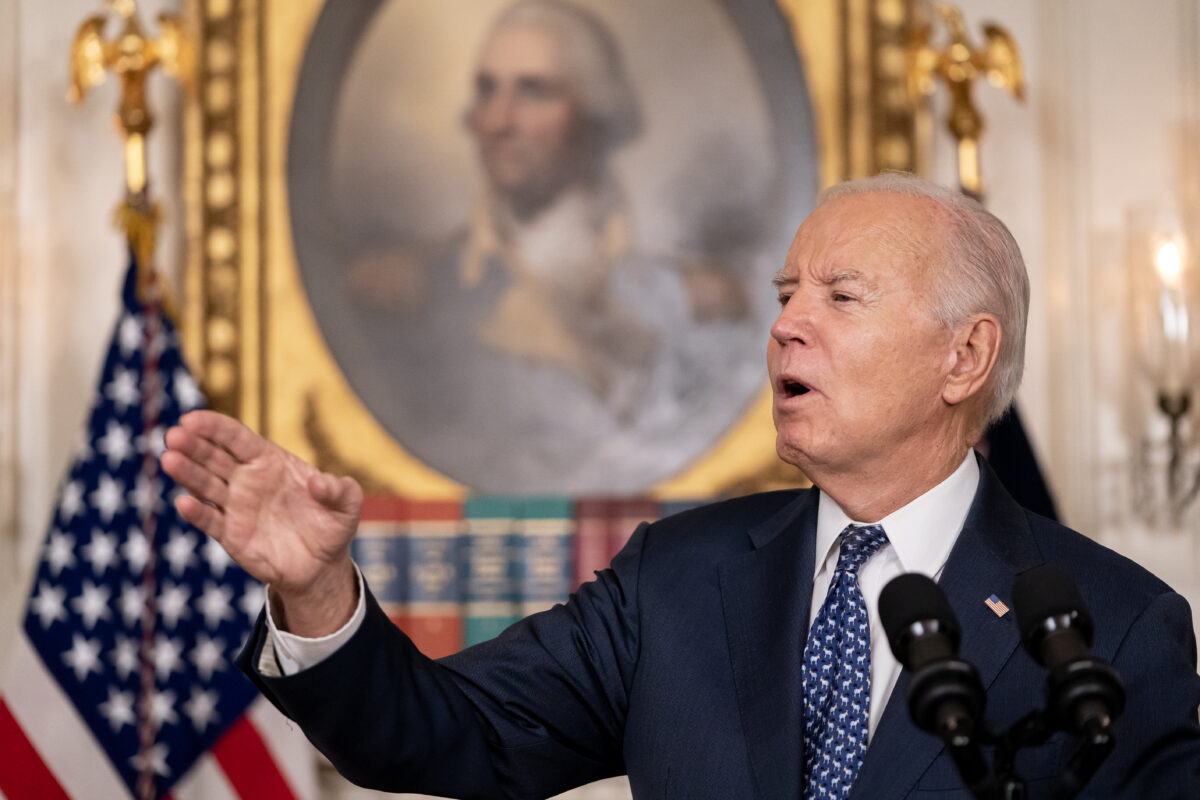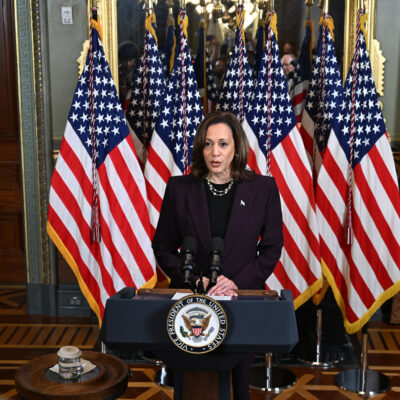Biden places new conditions on U.S. military aid following criticism of Israeli campaign
Sen. Chris Van Hollen (D-MD) said the new policy will give Biden leverage over Israeli PM Netanyahu and would ‘condition’ U.S. aid

Nathan Howard/Getty Images
President Joe Biden delivers remarks in the Diplomatic Reception Room of the White House on February 8, 2024 in Washington, DC. Biden addressed the Special Counsel's report on his handling of classified material, and the status of the war in Gaza.
President Joe Biden issued a new national security memorandum on Thursday evening that requires recipients of U.S. military aid to issue written certifications that they will comply with humanitarian and international law, and that they will cooperate with U.S. humanitarian aid efforts.
Sen. Chris Van Hollen (D-MD) who has been pushing Congress to pass similar policies, described the new memo as placing new “condition[s]” on U.S. aid which could give the U.S. more leverage toward Israel, as well as other allies. Although the new regulations apply globally, they come amid growing friction between the administration and Israel over its military operations in Gaza.
At a press conference on Thursday evening, Biden criticized Israel’s military campaign in Gaza. “I’m of the view, as you know, that the conduct of the response in the Gaza Strip has been over the top,” he said. He appeared to be responding to questions about the hostage negotiations and about the humanitarian situation in Gaza.
The Biden administration has thus far avoided placing any conditions or restrictions on U.S. military assistance to Israel, despite pressure from some progressive lawmakers. Biden said in November that conditioning aid was a “worthwhile thought,” a comment the White House later walked back. Legislation proposed by Van Hollen that would achieve the same aims as Biden’s new memorandum would likely have struggled to pass Congress.
The new policy, which comes as the White House is lobbying Congress to pass legislation providing additional military assistance to Israel, Ukraine and Taiwan, did not specifically name Israel or any other country.
A White House spokesperson did not respond to a request for comment on Thursday night seeking clarification. Earlier in the day, National Security Council coordinator for strategic communications John Kirby was asked whether Secretary of State Tony Blinken, during his travel to Israel this week, told the Israeli government about any conditions on U.S. aid.
“He made clear our concerns,” said Kirby, who did not say anything about conditions in his answer. “But we’re going to continue to make sure that Israel has what it needs to defend itself against Hamas.”
The new memorandum requires the secretary of state to obtain “credible and reliable assurances” from countries receiving military aid that they will use the aid in compliance with international humanitarian law and will not “arbitrarily deny, restrict, or otherwise impede, directly or indirectly” American and U.S.-backed humanitarian assistance efforts.
Any country, such as Israel, that is already engaged in hostilities using U.S. aid will have 45 days to provide these assurances, or aid will be suspended.
If the secretaries of state or defense subsequently assess that there is reason to question those assurances, the secretaries must provide a plan, within 45 days, to “assess and remediate” the situation, including requiring new assurances or cutting off defense aid.
The policy drew immediate criticism from the Republican Jewish Coalition. A spokesperson for the group called the memo “yet another piece of the Biden administration pressuring Israel unfairly.”
“We gave him relatively high marks at the beginning of the war, when he went over there in person to show solidarity, and we gave him credit for that. But this tonight was really, really ridiculous,” said RJC spokesperson Sam Markstein, also referring to Biden’s comment about Israel’s “over the top” conduct in Gaza.
Existing U.S. law already requires recipients of U.S. military aid to comply with U.S. humanitarian assistance efforts and that U.S.-provided weapons be used in compliance with U.S. and international law, but the requirement to obtain written assurances is new.
Air defense and other non-offensive military equipment are exempt from the new requirements. The secretary of state or defense would have the ability to waive these requirements in a limited manner “in rare and extraordinary circumstances justified by an imperative associated with the national security of the United States.”
The new memorandum also requires periodic briefings and reports to Congress including “an assessment of any credible reports or allegations that such defense articles and, as appropriate, defense services, have been used in a manner not consistent with international law.” Congress must also be notified when the measure is waived.
Van Hollen, who had planned to introduce an amendment with 18 colleagues to the emergency national security funding bill conditioning military aid to Israel and other nations that receive military assistance from the U.S., told reporters on Thursday evening that the memo was modeled off of his amendment, and incorporated “all of [the] key elements” of his legislation.
He told reporters that the memo would “give the Biden administration much more leverage to get the Netanyahu government” to reduce civilian casualties in Gaza and “political obstacles put in the way” of humanitarian aid to Gaza. He also noted that the tools would be “available worldwide.”
“As a condition of receiving U.S. military assistance, [aid recipients] will now promise in writing that they will comply with international humanitarian law and other international law as applicable,” Van Hollen said. “Number two, as a condition of receiving U.S. military assistance, every country will agree in writing, to provide credible assurances in writing, that they will help facilitate a US supported humanitarian assistance in the areas of conflict where they’re using US weapons, and not and not arbitrarily deny or restrict the provision of such humanitarian assistance.”
Van Hollen’s amendment earned the support of J Street, which has for several years sought additional restrictions on U.S. aid to Israel and on Thursday praised the new policy.
“J Street has for years called for greater oversight and accountability over arms and materiel provided by the United States to other countries, including Israel. American assistance — even to our closest allies — must not be provided in the form of a blank check,” J Street president Jeremy Ben-Ami told JI. “This memorandum also confirms America’s commitment to ensuring that its partners and allies do not restrict or impede the transport or delivery of humanitarian assistance.”
While Van Hollen’s amendment did not specifically target Israel, it was widely seen as directed at Israel’s military operations in Gaza.
Van Hollen said that the memo effectively accomplished the amendment’s goal, and that he will no longer seek a vote on it — sidestepping a vote that would likely have been opposed by Republicans and would likely have divided Democrats — some of whom vehemently oppose placing conditions on U.S. aid to Israel. The amendment would also have likely been a non-starter in the Republican-controlled House.
Spokespeople at AIPAC and Democratic Majority for Israel, two groups that have advocated against new conditions on U.S. aid to Israel, did not respond to requests for comment on Thursday night.









